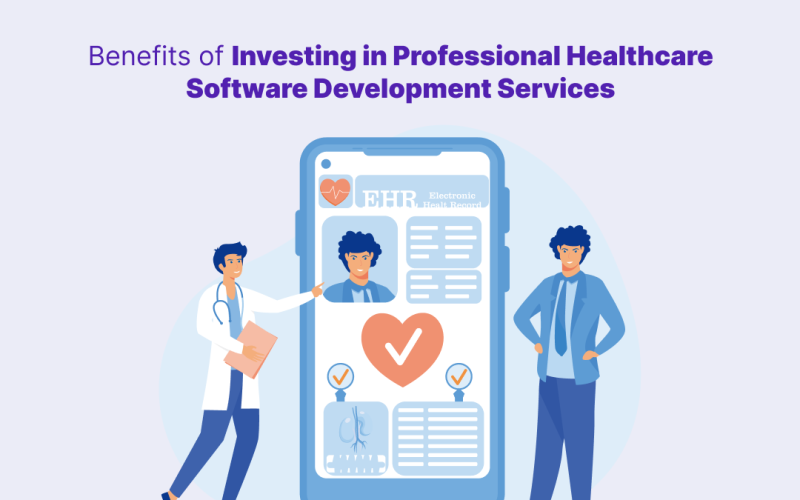Introduction
The healthcare industry is going through a major digital transformation. Hospitals, clinics, and medical professionals are adopting technology at a faster pace than ever before to meet the growing demands of patients, manage operations more efficiently, and maintain high standards of care. At the heart of this transformation is healthcare software development. Investing in professional healthcare software development services is no longer a luxury — it’s a necessity for organizations that want to stay competitive and deliver exceptional patient care.
Professional healthcare software goes beyond basic digital tools. It’s specifically designed to handle the unique challenges of the healthcare sector, from managing sensitive patient data to streamlining administrative processes and enabling remote care. When developed by experts, such software can significantly improve efficiency, accuracy, and patient satisfaction.
What Are Professional Healthcare Software Development Services?
Professional healthcare software development services involve creating customized software solutions tailored to the specific needs of healthcare providers. These services are offered by skilled development teams who understand both technology and the healthcare industry. They include planning, designing, building, testing, and maintaining software such as electronic health record (EHR) systems, telemedicine platforms, hospital management systems, and mobile health apps.
The main difference between professional services and generic software lies in the level of customization, compliance with medical regulations, and focus on long-term performance. Professional developers ensure the software is user-friendly for medical staff, secure for patient data, and scalable for future needs.
Key Benefits of Investing in Professional Healthcare Software
1. Improved Patient Care and Experience
One of the biggest advantages of professional healthcare software is the improvement in patient care. With electronic health records, doctors have instant access to accurate and updated patient information, which allows for faster and more informed decisions. Patients can also benefit from online portals where they can check test results, schedule appointments, and communicate with their healthcare providers easily.
When patients experience shorter wait times, personalized treatment plans, and seamless communication, their overall satisfaction with the healthcare provider increases.
2. Better Data Management and Security
Managing patient data is a critical part of healthcare operations. Professional software ensures that all data is stored securely and in compliance with regulations like HIPAA or GDPR. Features such as data encryption, role-based access, and regular backups help protect sensitive information from unauthorized access or loss.
By organizing data efficiently, healthcare providers can quickly retrieve information when needed, avoid duplication of tests, and make data-driven decisions for better outcomes.
3. Increased Operational Efficiency
Healthcare involves a wide range of tasks — from scheduling appointments and managing staff to processing insurance claims and maintaining medical inventories. Professional healthcare software can automate many of these tasks, saving time and reducing the risk of human error.
Automation also allows healthcare professionals to spend less time on administrative work and more time on patient care, improving the overall efficiency of the organization.
4. Seamless Communication and Collaboration
Hospitals and clinics often have multiple departments that need to work together, including doctors, nurses, lab technicians, and administrative staff. Professional software creates a unified platform where all departments can share updates, reports, and patient records in real time.
This smooth communication ensures that all team members are on the same page, which leads to faster diagnoses, more accurate treatments, and fewer delays.
5. Enhanced Accessibility Through Telemedicine
With the rise of telemedicine, patients can consult with doctors without having to visit the hospital physically. Professional healthcare software makes it possible to offer secure video consultations, online prescriptions, and remote monitoring.
This not only benefits patients living in remote areas but also helps healthcare providers reach more people while reducing the strain on physical facilities.
Specialized Features in Professional Healthcare Software
1. Electronic Health Records (EHR) Systems
EHR systems allow healthcare providers to store and manage comprehensive patient data digitally. They can include medical history, lab results, allergies, and current treatments, all accessible in one secure place.
2. Appointment and Resource Scheduling
Integrated scheduling tools help avoid double bookings, reduce patient wait times, and ensure efficient use of hospital resources such as operating rooms and diagnostic equipment.
3. Billing and Insurance Management
Professional healthcare software simplifies billing processes by automating invoice generation, payment tracking, and insurance claim submissions, reducing administrative workload.
4. Integration with Wearable Devices
Modern healthcare software can integrate with fitness trackers, heart rate monitors, and other wearable devices to collect patient health data in real time. This helps doctors track progress and make timely adjustments to treatment plans.
5. Data Analytics and Reporting
Analytics tools within professional software allow healthcare providers to monitor performance, identify trends, and make informed decisions to improve patient care and operational efficiency.
Read more: Why Healthcare Software Development Is Crucial for Modern Hospitals?
Why Professional Development Services Are Better Than Off-the-Shelf Solutions
While off-the-shelf software may be cheaper initially, it often lacks the customization and flexibility needed for healthcare environments. Professional services provide tailored solutions that meet the specific workflows and regulations of a healthcare organization.
Custom-built software can be updated and scaled as the organization grows, ensuring long-term value. It also offers better integration with existing systems, minimizing disruption during implementation.
Overcoming Challenges in Healthcare Software Development
1. Meeting Regulatory Compliance
Professional developers are well-versed in healthcare regulations and ensure that the software meets all legal requirements. This reduces the risk of costly penalties and protects patient trust.
2. Ensuring User-Friendly Design
Medical staff are often busy and cannot spend hours learning how to use new software. Professional development teams focus on creating intuitive interfaces that require minimal training.
3. Protecting Against Cybersecurity Threats
The healthcare industry is a prime target for cyberattacks. Professional software includes advanced security measures such as encryption, firewalls, and regular updates to prevent breaches.
4. Handling Large Volumes of Data
Hospitals and clinics generate massive amounts of data daily. Professional software is designed to handle this volume efficiently without compromising speed or performance.
Future Trends in Healthcare Software Development
The future of healthcare software will be shaped by advancements in artificial intelligence (AI), machine learning, and blockchain technology. AI can help in predictive diagnosis, personalized treatment, and automating routine tasks. Blockchain offers secure and transparent ways to store and share medical records.
Additionally, Internet of Things (IoT) devices will continue to play a role in remote patient monitoring, allowing doctors to track health metrics continuously and intervene before problems escalate.
As these technologies become more mainstream, healthcare providers who have already invested in professional software will be better positioned to adopt and benefit from them.
Conclusion
Investing in professional healthcare software development services is a strategic decision that brings long-term benefits to both healthcare providers and patients. From improving patient care and enhancing data security to streamlining operations and enabling telemedicine, professional software transforms the way healthcare organizations function. It ensures compliance with regulations, integrates smoothly with existing systems, and can be scaled to meet future demands.
For healthcare organizations looking to stay competitive in a fast-changing industry, partnering with an experienced app development company is a smart move. Such companies have the expertise to create customized solutions that address specific challenges and deliver measurable improvements. By making this investment, healthcare providers can enhance their efficiency, improve patient satisfaction, and prepare for a future where technology plays an even bigger role in healthcare delivery.
FAQs
Q1. What types of healthcare software can be developed by professionals?
Professionals can develop EHR systems, hospital management platforms, telemedicine apps, billing and insurance software, and patient engagement tools.
Q2. How does professional healthcare software improve patient care?
It gives doctors instant access to accurate patient data, enables remote consultations, and provides tools for personalized treatment plans.
Q3. Why is data security so important in healthcare software?
Healthcare software handles sensitive patient information, so strong security measures are essential to prevent data breaches and maintain patient trust.
Q4. Can professional healthcare software integrate with existing hospital systems?
Yes, professional developers can design software that integrates smoothly with current systems, avoiding disruptions in daily operations.
Q5. Is telemedicine a standard feature in modern healthcare software?
Many modern healthcare solutions include telemedicine features to allow remote consultations, making healthcare more accessible and convenient.













